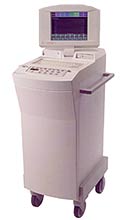
 Medical Division > Cryotherapy
Medical Division > CryotherapyWhat is cryosurgery?
Cryosurgery or freeze therapy is an advanced modality that is being used to treat initial or recurrent prostate cancer (it is being used also to treat kidney, liver, lung, breast and bone cancer). This advanced treatment is one of the few curative treatments that, in addition to being a Primary Therapy for Localized Prostate Cancer, it can be applied for local prostate cancer recurrence after failure of radiation therapy or seeds (brachytherapy). It is definitely better than brachytherapy for patients having urinary obstructive symptoms, as it helps to open the urinary channel over time.
Cryosurgery is normally done as an outpatient procedure either at a surgicenter or a hospital. Under local or general anesthesia, multiple small probes are placed under sonographic guidance, through the perineum (area between rectum and scrotum), into the prostate. By circulating argon gas through the probes, the prostate and some surrounding tissues are converted into an ice ball. As the ice ball is repeatedly formed and thawed with helium gas, the cells are killed and the area shrinks and is eventually replaced by scar tissue. A catheter is left in place for a period of time, and the patient goes home the same day or the following one. Pain is minimal as it is a non-invasive procedure. It takes a period of time for the killed tissue to pass and allow for normal voiding.
The CryoCare System
Endocare has developed the most efficient system for treating prostate cancer: the CryoCare System. With up to 8 cryoprobes you can optimally ablate a range of prostates sizes. In addition, the temperature can be easily monitored, providing confidence that -40ºC has been achieved throughout the treatment zone.
Data from a number of sources support the use of targeted cryoablation as a treatment modality. Only in Spain and Portugal more than thousand patients have been treated with the CryoCare System. - Decreased mobidity. Major complications such as urethro-rectal fistulas are now rare. - Targeted cryoablation is ideal for patients who have comorbidities such as heart disease, and in cases where a percutaneous option is more desirable. - The minimally-invasive, targeted cryoablation procedure requires only a 24-hour hospital stay, with a return to normal activities in 5 to 7 days. |  |
If you are an urologist, please contact us for more information
If you are a potential patient, please ask your physician about cryotherapy


 91 616 58 14
91 616 58 14





